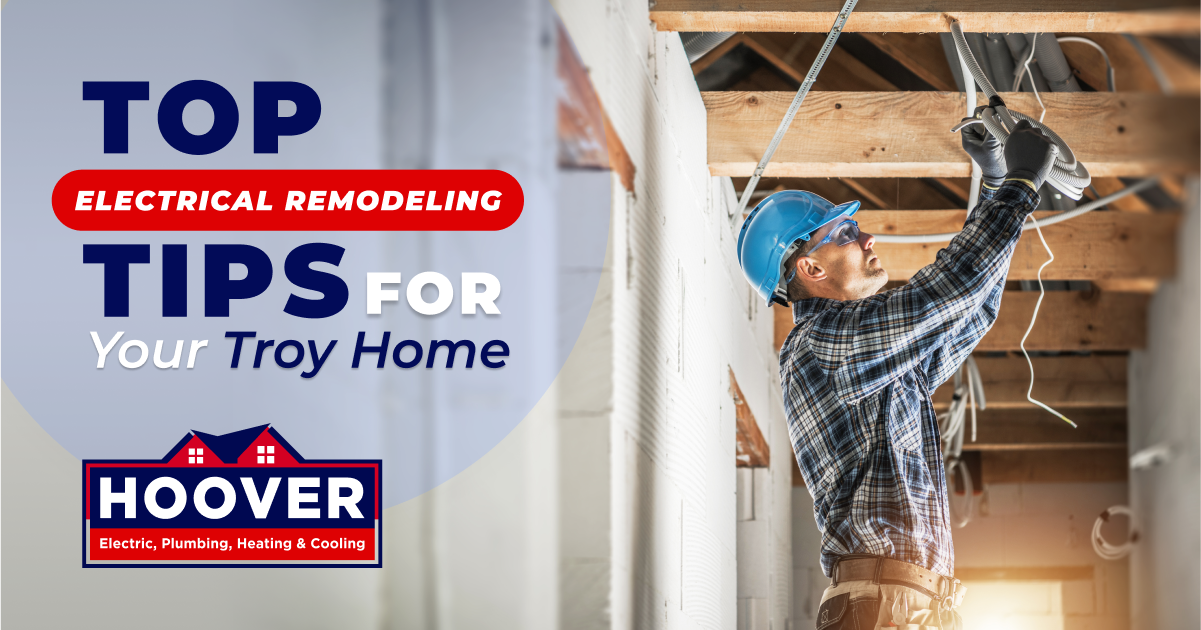
Renovating your Troy, MI is certainly exciting, but it also opens the door to an array of potential issues, especially with your electricity. Don’t let a lack of electrical skills make things worse. The team at Hoover Electrical, Plumbing, Heating, and Cooling is here to help with your electrical remodeling in Troy, so you can tackle your next major home project with confidence.
Why Electrical Upgrades Matter
When you renovate your home, you could run into issues you didn’t know existed beforehand, including electrical problems. Perhaps you want to open up your space for a kitchen remodel, only to discover that your home has aluminum electrical wiring instead of copper, which poses a serious safety hazard. Now, you’ll need to rewire the entire home to prevent a house fire and keep things safe and up to code.
Here are more reasons why electrical upgrades matter when renovating or getting a new home addition:
- New appliances: Adding new appliances could mean you’ll need to add more outlets or circuits. Doing this ensures that your new appliances can handle the increased electrical load and will prevent blown fuses or circuit overloads.
- Bathroom remodels: A kitchen and/or bathroom remodel should include new GFCI (Ground Fault Circuit Interrupter) and AFCI (Arc Fault Circuit Interrupter) outlets. GFCI outlets protect against electric shock that can occur when the outlet comes in contact with water and should be installed in bathrooms. AFCI outlets detect abnormal arcing in a circuit to prevent fires and should be installed in kitchens and living rooms
- New electrical panel: You may need a brand-new electrical panel, especially if you’re doing a major remodel. Replace your service panel if you notice frequent tripped breakers, burning smells coming from the panel, or flickering lights or appliances.
Common Electrical Upgrades for Home Remodels
Whether it’s a kitchen, bathroom, or basement remodel, here are some of the most common electrical upgrades that Troy, MI homeowners make:
- Complete home rewiring in Troy to replace old, outdated knob-and-tube or aluminum wiring
- Upgraded outlets and breakers to meet the demands of new appliances
- Smart home upgrades including electric vehicle chargers
- Lighting upgrades like recessed lighting, under-cabinet lighting, and energy-efficient options such as LED lights
- Installing dimmer switches and programmable thermostats
- Updating light fixtures and ceiling fans
- Changing old outlets to GFCI and AFCI outlets to improve safety
Planning Your Electrical Remodel
While you can plan some aspects of your home’s electrical remodel yourself, a professional electrician in Troy like one of the team members at Hoover will ensure it’s done right. Here’s what’s involved in planning an electrical remodel:
- Our professional electricians will determine your home’s required electrical load so that it can safely handle the increased demand.
- We’ll map the electrical layout and inspect the wiring and outlets in your home to confirm whether you should repair or replace certain components.
- An electrician will confirm that your remodel has sufficient electrical outlets and that the correct types are installed in the corresponding rooms.
- You’ll determine if or where you want certain upgrades to your current lighting, ceiling fans, and other fixtures.
Hiring a Qualified Electrician
When you’re planning a home remodel, hire a qualified, licensed electrical contractor in Troy like Hoover Electric, Plumbing, Heating, and Cooling. We’ve been in business since 1980 and have completed over 75,000 jobs. Our skilled electricians stay up to date with the most current technologies and methodologies in our field to ensure that your electrical upgrades are performed to the highest safety and quality standards.
Understanding Troy’s Electrical Codes
Just like other parts of the country, Troy’s electrical codes are updated regularly. That’s why it’s so important to hire experienced, licensed electricians who understand the many nuances of the local electrical codes. In the city of Troy, all dryer exhaust ducts must be mechanically fastened and sealed at all joints, and that’s just one example. The Hoover Electric team makes sure that we follow the latest codes and obtain the necessary permits to ensure that your electrical remodel is performed safely and accurately.
DIY vs. Professional
There may be a few electrical upgrades you can do yourself, like switching some of your outlets or faceplates. However, it’s important to understand the differences between DIY and professional electrical work.
- Safety: Professional electricians have the training and experience to handle electrical components safely to minimize the risk of fires or shocks.
- Compliance: Electricians know the local electrical codes, ensuring that everything is in full compliance.
- Fast, effective diagnosis: Trained electricians can diagnose and identify potential problems in advance to prevent issues later.
- Guarantees: Professionals like Hoover provide guarantees of their work, giving you peace of mind.
- Cost: DIY electrical upgrades can be expensive, especially if the unregulated work leads to bigger problems later on.
- Financing: When you hire the pros at Hoover, we offer flexible financing options to help you pay for your upgrades over time.
Contact Hoover for Your Electrical Upgrade Today
There’s no need to feel stressed about your next electrical remodeling with Hoover around. We offer free estimates, and we’re here to ensure you have a stress-free renovation. If you’re ready to make the next move or want to learn more, contact us today!
Frequently Asked Questions
How do I know if my existing electrical system can handle my planned renovations?
A licensed electrician can assess the amperage capacity of your existing electrical system to determine if it can handle the renovations. They’ll also inspect the wiring and calculate the potential electrical load your renovations will require.
What are the signs that my wiring needs to be updated?
If your wiring is frayed, made of aluminum, or if there are loose connections, it likely needs to be updated. Other signs include flickering lights, frequent blown fuses, and circuit breaker issues.


